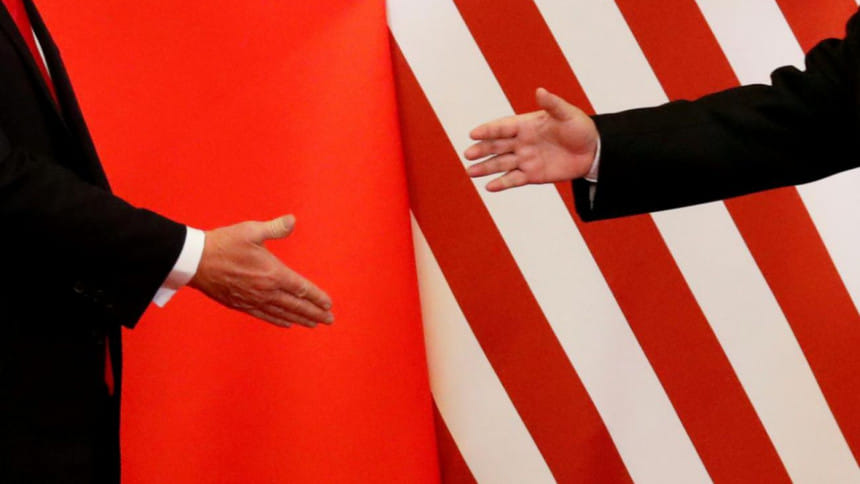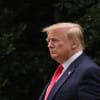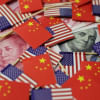Will US-China trade war really break out?

The objective of Donald Trump's controversial executive orders, since his walking into the Oval Office, has been to make "America Great Again". In the past 15 months, he has signed 63 EOs, claiming that he has accomplished more than most previous US presidents. His latest order was issued on March 22, which proposed to impose up to 25 percent tariff on USD 60 billion worth of Chinese exports to the US. This follows Trump's State of the Union address on January 30, when he said that the era of "economic surrender" is over. Beijing did not dither over responding to Trump's decision and announced that it will also impose tariffs on USD 3 billion worth of US exports to China.
US-China relations are extremely complicated, encompassing economic, commercial and security issues—issues that cannot be separated from each other as they are intertwined. Why did Trump come up with this drastic threat then? Firstly, Trump, during his presidential campaign, repeatedly said that China was cheating America on trade. So, he has set out to correct the situation. Secondly, the Trump administration has threatened to take this drastic step to counter two problems with China—i) stop intellectual property right thefts by China, and ii) reduce the ballooning trade deficit with China.
How have the US-China commercial relations come to this situation? China has been allegedly stealing US Intellectual Property Right (IPR) for quite some time, although under WTO protocol such activities are banned. This has happened through two ways—firstly, through illegal industrial espionage, and secondly, US companies are legally required to transfer technological know-how to their Chinese counterparts in US-China joint-venture companies in China. According to estimates, IPR theft has caused American businesses to lose around USD 50 billion per year.
The trade balance in favour of China stood at USD 375 billion as of December 2017. How has this imbalance happened? American manufacturers have relocated to China to take advantage of the cheaper labour costs. The finished products are then imported to US with "Made in China" marks and sold at lower prices compared to those made in America. "Made in USA" products are no longer competitive in the international markets because of their higher manufacturing costs, except for high-tech machinery. Outsourcing American manufacturing to developing countries has resulted in job loss. The other reason why Chinese products are cheaper is the partially fixed exchange rate between the yuan (RMB) and dollar that makes Chinese products artificially cheaper.
On the economic side, China has gained a formidable leverage by buying US treasury bonds. As of January 2018, US debt to China stood at USD 1.17 trillion. By buying US bonds, China has directly helped US bank interest rates to remain low. If China were to stop buying US treasury bonds, the US federal government would have to borrow money for its budget from local banks driving the interest rates very high. That would create a terrible financial backlash throwing the US economy along with the rest of the world into recession. China knows that recession would mean lower demands for Chinese consumer products in the US market. But if Trump's push comes to shove, Beijing would probably not hesitate to call in its loan from US.
Can Washington really reduce the trade deficit with China? It can probably partially achieve that through negotiations but not through a trade war, since the US accounts for only 18.4 percent of Chinese exports (2016). The reason is quite simple: imposing tariff on Chinese goods would mean higher prices for American consumers, meaning lower demand for American products made in China. That would lead to a decline of American business. Both US businesses and China would face job losses. Even if some manufacturing returns to the US, it would not improve the employment figures in the US as most of those manufacturing would be done by robots not American human labour force, primarily to keep the cost of production low.
Donald Trump cannot be blamed for threatening to take steps to bring about some degree of balance in trade with China. As a matter of fact, any nationalist leader would try to do that. The problem is, China has still not opened its economy fully. China's yuan is still not fully convertible in the capital account. Its pegged rate dissuades foreign investors from investing in its stocks.
China's economic growth can be ascribed to its rapid industrialisation producing labour-intensive goods at lower cost and exporting them the world over. Although its living standards have improved, it has largely kept its internal market protected from imported goods with quotas. However, because of lower labour cost, China continues to be a lucrative place for FDI for major manufacturers of the West, attracting USD 139 billion in 2016. Here, David Ricardo's comparative advantage theory and maximisation of consumers' utility come into the picture of global trade, which China exploited fully. No wonder Xi Jinping loudly campaigned for globalisation and free trade at Davos World Economic Forum in January 2017.
Trump's policy has little to do with economics—it is actually a political strategy. Can Trump push China to open up its economy fully? Probably, to an extent. The announcements made by both Washington and Beijing about tariffs on each other's products are still threats, though a real war is quite possible. Trump's economic adviser Larry Kudlow said that the US was not looking for a trade war. The tariff structure has not yet been enacted but proposed, said Kudlow.
Tariff wars will not only affect the two largest economies adversely but will also affect global commerce as these tariff walls will become insurmountable for third countries engaging in trade with the US and China.
Can the WTO play any role in bringing the two adversaries to the table and compel them to abide by the WTO rules? Quite unlikely. Besides, Donald Trump has been threatening to quit WTO. Both Washington and Beijing should resolve the trade imbalance through negotiations and not by raising tariff walls.
Mahmood Hasan is a former ambassador and secretary of the Bangladesh government.











Comments